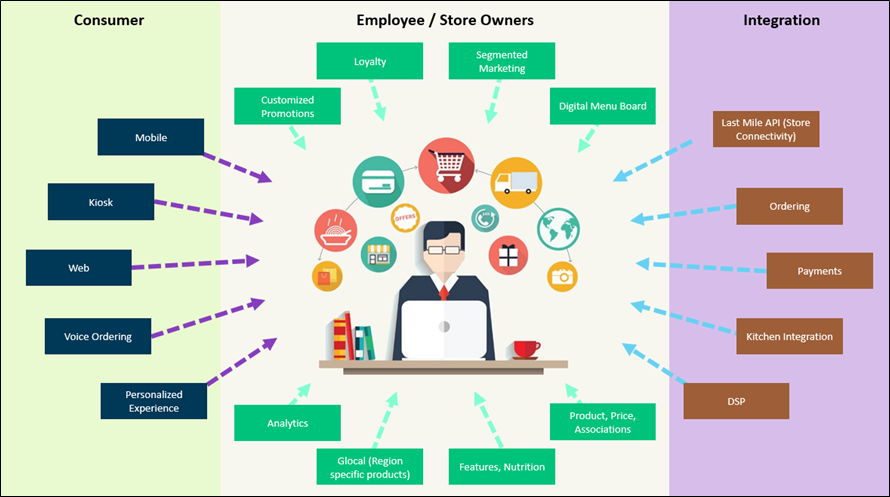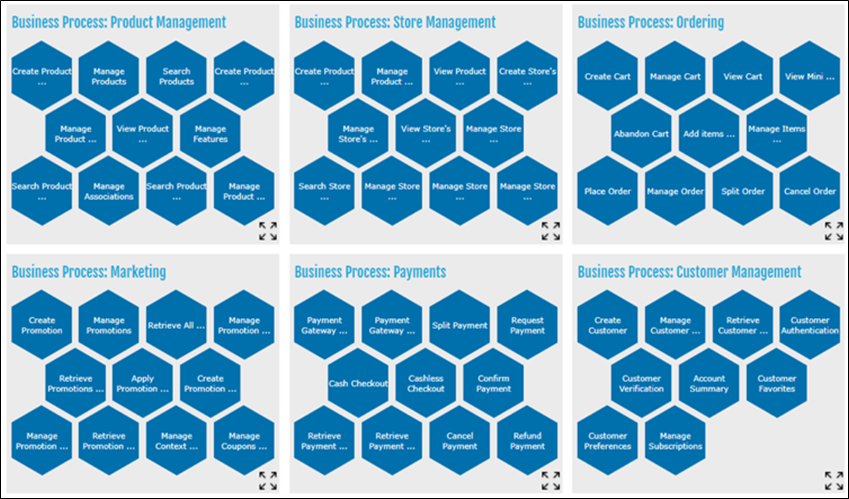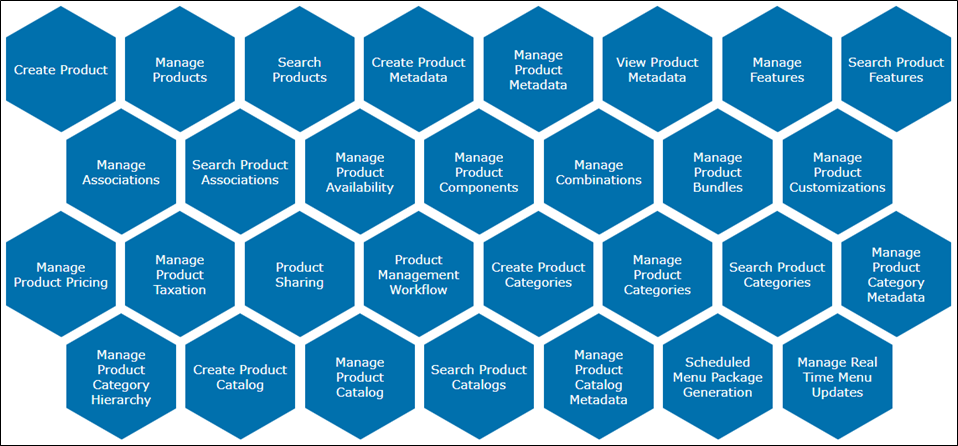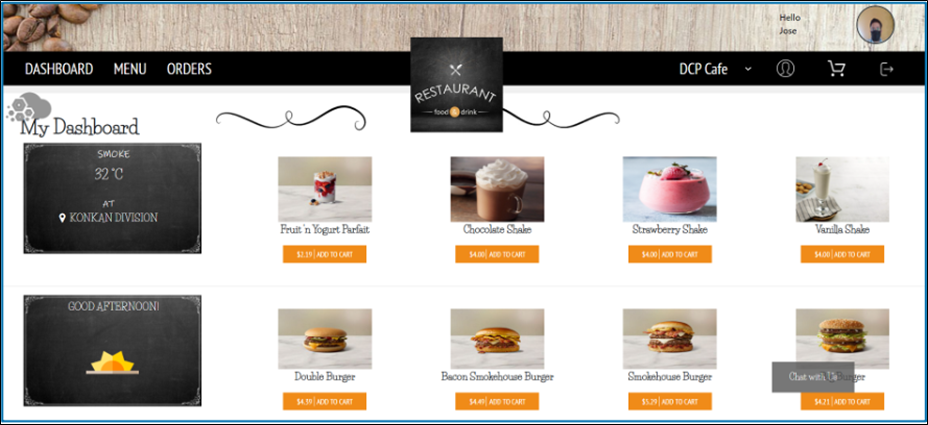The restaurant industry is experiencing an unprecedented transformational change. Business disruptions from the global health crisis prompted the restaurant industry to restructure and diversify its operating model and digital portfolio in response to the shift of market trends and customer preferences.
Elevated expectations for cleanliness, health, and safety are accelerating the adoption of contactless technologies, curbside pickup options, and mobile payments to minimize human interaction. Gartner predicts most organizations will leverage contactless technologies for up to 80% of their ordering and replenishment activities by 2024.
Restaurant businesses must prepare to meet the operational requirements of the new normal and drive supply chain efficiency. Furthermore, restaurants should thrive to maintain brand loyalty by providing a seamless and differentiated omnichannel experience through enhanced digital capabilities.
In this post, we will show you how Capgemini’s Digital Cloud Platform (DCP) for Restaurants empowers the industry to reimagine digital transformation by delivering compelling customer interaction and streamlined operations while reducing costs and improving efficiency.
Capgemini is an AWS Premier Tier Services Partner and Managed Service Provider (MSP) with a multicultural team of 325,000 people in nearly 55 countries. Capgemini has more than 12,000 AWS accreditations and over 4,900 active AWS Certifications.
Solution overview
Capgemini’s Digital Cloud Platform (DCP) for Restaurants is a high-velocity software engine that enables rapid innovation for restaurant businesses.
Leveraging the breadth and depth of Amazon Web Services (AWS), DCP provides a comprehensive collection of cloud-native built-in accelerators for building an end-to-end restaurant experience. DCP’s library of customizable software components reduces time-to-market and improves the return of investment (ROI) by up to 50%.
Furthermore, DCP enables end-to-end connectivity and integration between existing systems, data, and new business capabilities. Over 75,000 restaurants across 120 countries leverage DCP capabilities for digital transformation.
The following diagram shows the business processes provided by DCP across the restaurant value chain, ranging from omnichannel customer experience, personalization, menu and kitchen management, and online ordering, to loyalty, promotion, and system integration with point-of-sale (POS), payment, and logistics.
In this section, let’s look at how restaurants can easily configure a fully functional online presence using DCP:
- Log in to the DCP console and choose a solution blueprint such as online ordering. The visual library consists of Capgemini’s view of business processes for online ordering, including product management, store management, ordering, marketing, payments, and customer management
- Next, expand the selected business process such as product management and choose relevant business function components. For example, the product management business process provides functions to create a product catalog, search products, and manage real-time menu updates.
- Business functions are exposed as pre-built REST APIs following microservice principles. For example, the product association API manages the metadata for the fields of association types.
- Repeat steps 1-3 to add more business functions. Users can customize the online storefront using pre-built APIs from the DCP catalog
Solution benefits
Designed with restaurant industry needs in mind, DCP provides a multifaceted solution that enables restaurants to launch a fully functional, cost-effective, and omnichannel food ordering experience with faster time-to-market.
Capturing actionable insights is essential to gain a holistic view of the end-to-end guest experience. Built with microservices and cloud-native architecture, DCP provides a scalable and extensible platform to support future business growth, including multiple brands management, geographic expansion, and artificial intelligence-enabled analytics.
Solution architecture
The following architecture diagram provides a high-level outline of key services used in DCP.
- User logs in to an admin application hosted on Amazon Simple Storage Service (Amazon S3) through a fast and secured custom domain managed by Amazon CloudFront, Amazon Route 53, and AWS Certificate Manager.
- User selects the desired business functions from the admin interface. Then, appropriate microservices and resources will be deployed to the user’s AWS account through Amazon Elastic Container Registry (Amazon ECR) and AWS CloudFormation.
- The admin application sends requests to the business function microservices running on AWS Lambda, Amazon Elastic Kubernetes Service (Amazon EKS), and Amazon Elastic Container Service (Amazon ECS) through Amazon API Gateway.
- Business function APIs leverage core services, including:
- Cost-effective and scalable document store on Amazon S3.
- In-memory data cache with sub-millisecond latency on Amazon ElastiCache for Redis.
- Fully managed messaging and email service by Amazon Simple Notification Service (Amazon SNS) and Amazon Simple Email Service (Amazon SES) for mass transactional and marketing communication.
- Identity management for secure user sign-up and sign-in across the web and mobile apps using Amazon Cognito that scales to millions of users and supports integration with social and enterprise identity providers via SAML 2.0 and OpenID Connect (OIDC).
- Search, index, visualize, and analyze petabytes of text and unstructured data using Amazon OpenSearch Service.
- Automate employee identity verification and workplace safety with facial recognition and computer vision APIs using Amazon Rekognition.
- Conversational AI chatbots using Amazon Lex that allows customers to place online food orders, make a table reservation, and request delivery status.
- Real-time personalized recommendations using Amazon Personalize, including product ranking, specific product recommendation, and customized direct marketing.
- Derive valuable customer insights using Amazon Comprehend, including sentiment analysis and product reviews.
- Business function microservices follow event-driven architecture. Real-time interactions between services are facilitated by Amazon Managed Streaming for Apache Kafka (Amazon MSK).
- DCP uses relevant database services, including Amazon DocumentDB, Amazon DynamoDB, and Amazon RDS for PostgreSQL, based on data types used by business functions.
- Business function APIs and core services are monitored by Amazon CloudWatch for unified operational health and complete observability of the AWS cloud environment.
Conclusion
Running a successful business in a rapidly evolving and competitive restaurant industry takes more than creating a profitable menu and choosing an ideal location.
Restaurant businesses must optimize financial performance by regularly evaluating key performance indicators, including sales, food and labor costs, time per table turn, online ordering, sentiment analysis, inventory, and operational efficiency.
Furthermore, restaurants must transform and enhance the digital guest experience with innovative technologies to adapt and gain a competitive advantage in future restaurant models.
With extensive restaurant industry experience and a strong relationship with AWS, Capgemini helps multiple major restaurant brands re-envision and transform their business models with innovative technologies at an accelerated pace.
In this post, we covered how Capgemini’s Digital Cloud Platform (DCP) for Restaurants enables innovation at scale and drives actionable data insights by developing customer-focused innovation. We provided an overview of DCP, including features, benefits, and reference architecture.
Please reach out if you have any questions, or you can learn more about DCP on the website for Capgemini restaurant solutions on AWS.
Visit us to learn more about AWS and Capgemini, and get in touch with one of our experts.
Digital Transformation
Read More from This Article: Reimagining Digital Transformation with Capgemini’s Digital Cloud Platform for Restaurants on AWS
Source: News








